Windows 7 Performance Guide
by Ryan Smith and Gary Key on October 26, 2009 12:00 AM EST- Posted in
- Systems
Laptop Performance
With the different power and performance characteristics of a laptop (not to mention the battery!) we’re going to break out our laptop results from the rest of our desktop data.
If you have seen our OS Mobility Explored article, where we compared laptop usage across Windows and Linux, then you should have a pretty good idea of what you’re about to see. The following is a selection of the most relevant data from that article, using Gateway’s very similar Intel and AMD power laptops: the NV5807u and NV5214u respectively.

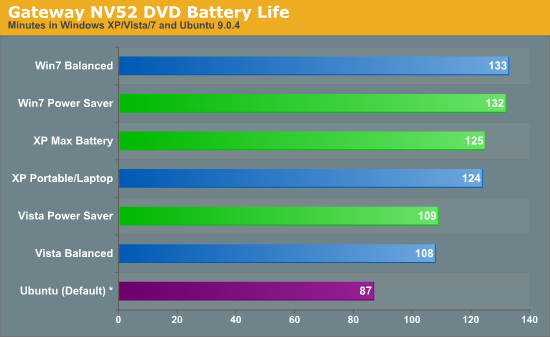
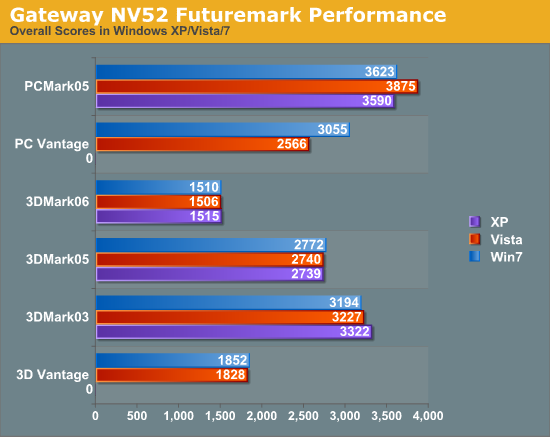
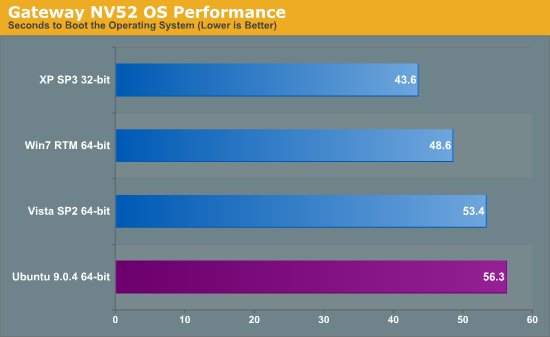
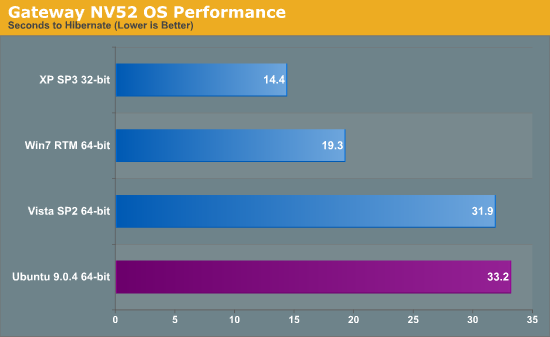
Starting with the NV52, our Athlon 64 X2 laptop, we see some immediate advantages for Windows 7. In terms of battery life it edges out Windows XP in all situations, and clearly surpasses Vista, particularly in DVD playback. As laptops have been one of Vista’s most troublesome areas, it’s here where Microsoft needed to see some real improvement, and they have delivered.
Meanwhile performance in our limited suite of benchmarks is largely tied. Vista wins in PCMark 05 only due to higher scores in the transparent windows test (something we suspect is a product of the WDDM 1.1 memory optimizations), XP takes 3DMark 03, and Win7 takes PCMark Vantage. Our tendency is to put more weight in to PCMark Vantage, since it’s quantifying the improved laptop performance that we’ve been experiencing, but aren’t necessarily seeing in other benchmarks.
Finally we have boot and hibernation times. Microsoft has been putting some effort in to bringing down the boot times of Vista, and it shows here, although XP is too tough to beat. Hibernation is a similar story – it’s easier to resume from hibernation when you have less stuff to load.
The NV52 paints what’s probably going to be the average picture for Windows 7 on laptops. It’s as fast (if not faster) than XP and can pull off a slightly better battery life, but it’s not going to be able to beat XP in booting/hibernating.
Next we have the NV58, our Intel C2D laptop.
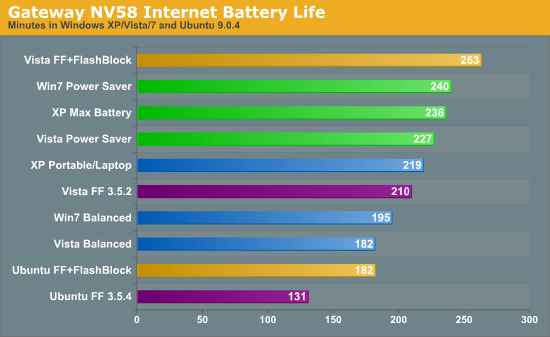
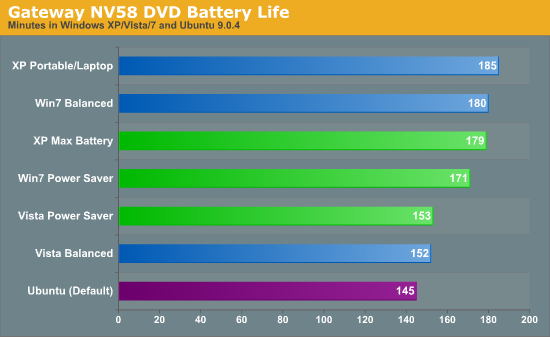
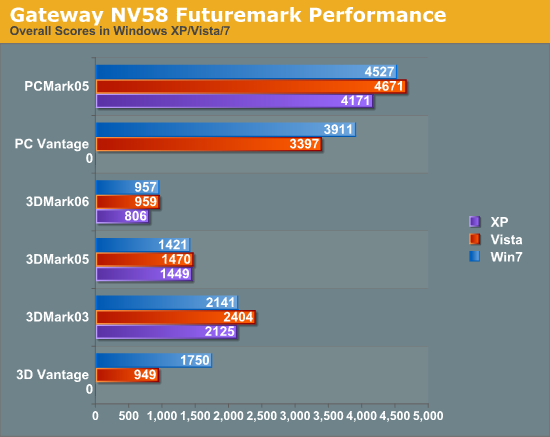
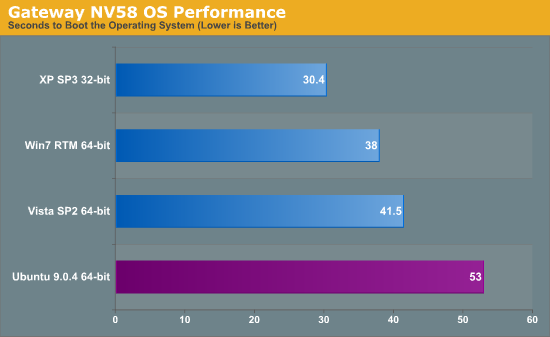
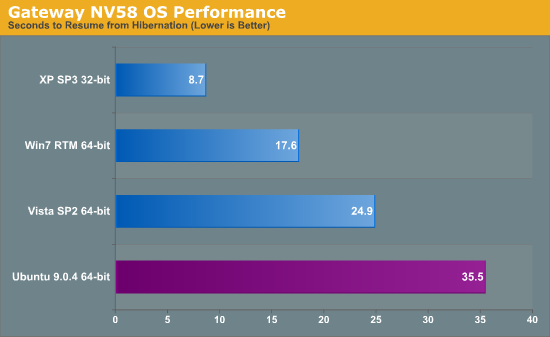
With battery life, we see some things similar to the AMD based NV52, and some things are different. Vista is still a loser, but Win7 doesn’t manage to build any kind of lead over XP in DVD playback, letting XP take it by a small margin. Battery life in our internet testing does go to Win7 however, once again with a small margin.
As for performance, we largely have the same results as with the NV52. Win7 wins PCMark Vantage, the test we care the most about, and pulls near-even elsewhere. 3DMark Vantage is an outlier this time, but this seems to be related to the Intel integrated graphics in this laptop.
Finally boot and hibernation times are similar to what we saw with the NV52. XP is still faster to boot and faster to return from hibernation, the benefit of an older, lighter-weight operating system. Win7 does handily beat Vista in all cases, however.










207 Comments
View All Comments
Spivonious - Wednesday, October 28, 2009 - link
Vista/7 have I/O priorities. If the game needs to access the hard disk then the AV scanner (assuming it was written to take advantage of priorities) will pause. Should be little to no performance loss.The default auto-defrag setting is once a week, not daily. I find it really helps with overall performance.
ibarskiy - Monday, October 26, 2009 - link
Just WTF are you talking about?!1) Browser is much more essential for an average user, so by extension, if bundling the browser (a more essential component) is viewed as anti-competitive, it is certain that bundling less essential components would also be viewed as such. In that respect, it was completely reasonable to anticipate it. It is entirely silly / idiotic (you pick, I pick the latter), but it is not MS's doing, it's the EU regulators'. Bitch at them.
2) You don't need to manually defrag (it has been background since Vista)
3) You don't need registry cleaners
4) You don't need layers of malware protection and, factually, it is more difficult to compromise than OSX, that's been shown
5) You don't need various 3rd party utilities - difficult to guess here what you are talking about since no specific reference is made - but then again, that's how you bashers typically operate
6) It is one of the more reliable systems out there; again, please talk specifics. Since Vista, Windows very rarely crashes.
What is pretty sad is that morons such as yourself with clear misinformation are allowed to impact other people's opinions.
The0ne - Monday, October 26, 2009 - link
I would like to see more tests on laptops if possible. The snappy UI of Windows more than makes up for it's performance/lack-there-of. This is especially true of replacing Vista. Regardless of the performance, Windows 7 has the driver and snappy-ness to warrant the replacement of XP and Vista.This test is where one truly finds what a joke Vista OS is.
The0ne - Monday, October 26, 2009 - link
Tom's hardware has the conclusion for what I'm asking for. I'll wait to see if Anandtech can do something similar as Tom's is litter with script junk. Thank God for noscript.ATWindsor - Monday, October 26, 2009 - link
"To that end, I certainly wouldn’t recommend running Win7 at the default UAC level for any computer connected to the internet."That depends on the user, frankly, all you need is an updated OS and a firewall, and one should be resonably safe, those two things will in most cases limit attacks to the types where the user has to manually execute a file. People got by on XP without problems, Win 7 with UAC level 2 is much more safe than that. Of course there will be less skilled users who run into problems, but as a skilled user, one should be fine.
Griswold - Tuesday, October 27, 2009 - link
"That depends on the user, frankly, all you need is an updated OS and a firewall, and one should be resonably safe, those two things will in most cases limit attacks to the types where the user has to manually execute a file."No, because:
"And that’s a risky proposition when a UAC prompt may be all that’s left between malware executing and running amok or not."
No firewall or AV is going to protect you if all it takes is a brand new little trojan using this flawed security concept to gain highest privileges. And thats why I set UAC to level 4. I got used to it by having vista do the same for 2.5 years.
Genx87 - Tuesday, October 27, 2009 - link
IMO my biggest disappointment in Win7 was Microsoft gave into the XP whiners who love no security with an admin account. They tuned the thing down and gave the user the ability to elevate its protection. Personally I run with a user level account in Win7 and left the default settings. When Win7 shows up on our network Ill have to configure a GP to stick the thing at the highest setting and disable the ability of the users to change it.But for mom and pop. They will either turn it off or get infected with something that disables it. The end result is basically XP level security which is a huge step backwards.
Zoomer - Monday, October 26, 2009 - link
I installed vista with UAC off, apps automatically run as admin, and it was fine. Since n/vlite wasn't quite ready for w7 a few months ago, I just disabled UAC.Don't see the point of these. I'm still looking for a good command line av or at least something that does not install services. Getting tired of the java AV scanners.
Devo2007 - Monday, October 26, 2009 - link
Looks like you used the wrong graph on Page 11 (the first graph). That one compares different motherboards, rather than Win7/Vista/XP.darwinosx - Monday, October 26, 2009 - link
Most of the graphs are meaningless anyway.